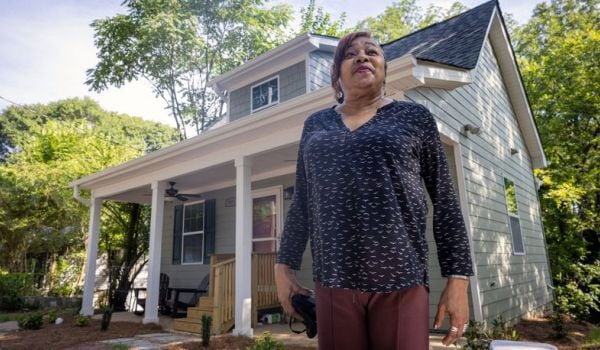When Laura Prior started her second master’s degree at the University of Toronto in July, she quickly learned that her classwork might just be the easy part — at least compared to the uphill battle of finding housing.
“It’s very expensive in Toronto and the spaces available for the amount of rent [students] could afford were very small [and] not in great locations,” she says.
It’s a predicament felt by hundreds of thousands of students across the country. In 2021, Toronto was the third least affordable city on the entire continent. Last year, the average asking rent for a one-bedroom apartment in Toronto was about $1,700 CAD ($1,200 USD), according to the Canada Mortgage and Housing Corporation.
Then Prior came across SpacesShared, a home-sharing startup that has worked with a slew of colleges and universities to pair up 500 students in need of affordable housing with seniors in need of companionship.

Laura Prior (Photo courtesy SpacesShared)
“When I started looking for alternative options, I came across SpacesShared and their program of connecting inter-generational living,” Prior says. “I asked, do you have any housing? And that was it.”
Intergenerational living
The startup’s model of pairing students with seniors in Toronto has shown to be a win-win solution that can replicated across Canada and beyond, its creators say. Their cheapest matched student is paying $415 CAD ($307 USD) a month in rent – a far cry more affordable than most student housing options in the city.
The startup describes its mission as alleviating two critical social issues face: seniors’ desire to age in their own homes while remaining connected to their communities, and students’ need to secure safe and affordable housing close to their campuses.
“Beneath the housing crisis, there are probably millions of empty bedrooms across Canada hidden from the market,” says Rylan Kinnon, CEO and co-founder of SpacesShared.
It’s not the usual “senior citizen has extra bedroom” scenario, says Kinnon. These are seniors motivated less by the rent check and more by their desire for companionship to beat loneliness. Indeed, researchers estimate that one in every five Canadians above 65 suffers from chronic loneliness.
The development and maintenance of intergenerational relationships is a protective factor against social isolation not only for older adults, but crucially also for students in Canada, says Jackie Tanner, a gerontological social work expert who co-founded SpacesShared.
Homesharing is a concept that’s long been shown to be beneficial, she notes. The startup is simply adapting it for the digital ecosystem.
SpacesShared operates in four Canadian provinces, most prominently in Ontario, where it has partnered with Brock University, Humber College, St. Lawrence College and Sheridan College. Its aim is to lessen the accommodation headache for colleges with limited student residencies.
Each student-senior pairing is unique, the company says, but students also receive discounts on rent for carrying out minor household tasks: picking the fall leaves, snow shoveling, watering flowers, or taking the garbage out. The platform takes on the task of conducting background and identity checks on seniors and students, and it requires proof of enrollment in a college or university.
“Intergenerational homesharing allows for the leveraging of a resource that we have quite a lot of in Canada — empty spare bedrooms,” Tanner says. “The cost for opening up these bedrooms is quite low in comparison to other housing solutions, but the feeling of safety needs to be there for it to work.”
_920_690_80.jpg)
Rylan Kinnon and Jackie Tanner, co-founders of SpacesShared. (Photo courtesy SpacesShared)
It’s an experiment that has worked well so far for Awofadeju Olajide Simon, a Nigerian student who is studying at Toronto’s Centennial College. He told CBC that he bikes, cooks and plays music with the elderly couple whom he lives with. Before living with the seniors, he was “stressing out” about getting a room in expensive Toronto without meeting requirements like healthy credit scores.
Prior, too, says that her arrangement has allowed her to live within her financial means. But it’s also improved her quality of life, she tells Next City.
Living in a new city, especially such a large one, can be intimidating, she says. Prior moved to Toronto from 2,300 kilometers away in Newfoundland and Labrador, one of Canada’s least populated provinces.
But the senior woman she is paired with has lived all her life in Toronto and quickly became “a really great point of contact” – showing Prior how to use the city’s transit system, where to find emergency service points, and where to shop sustainably.
And she appreciates that her presence can serve as a balm, rather than a nuisance, for her elderly roommate-landlord.
“I think a lot of people enjoy having someone to come home to at the end of the day,” she says.
Beyond new construction
Pairing students with seniors is not a Band-Aid solution. It’s actually an important innovation, says Penny Gurstein, co-director of the Housing Research Collaborative at the University of British Columbia.
“We need more affordable and nonprofit housing, and solutions like SpacesShared are ideas that should be tried out,” she tells Next City. “Sharing existing homes is certainly something that could be viable and there is a massive amount of empty bedrooms. This wouldn’t necessarily need government intervention, which building housing would.”
Solutions like home-sharing are crucial to better use the city’s existing housing stock, says David Hulchanski, a professor of housing and community development at the University of Toronto.
The issue is the mismatch between household size and dwelling unit size. This maldistribution has been recognized for many decades by Canadian policymakers, he says, pointing to a highly influential study that has been at the desk of government officials for many years.
“The dwelling size/people per dwelling mismatch is, of course, directly related to the biggest mismatch: the huge income and wealth gap,” he says.
“The wealthy have too much of everything and those at the bottom too little of life’s essentials, and in some cases with housing, nothing – as in the dehousing processes producing mass homelessness these days.”
A correction of the maldistribution of housing can be achieved only by a correction of the maldistribution of income, he says. The usual distribution of income, taxes and welfare payments have consistently failed to achieve this goal in Canada, he says.
So far, Kinnon tells Next City, no big disputes have so far emerged from its experiment in students living with seniors. The only exception? One student who told SpacesShared that her landlord’s cat mewed too loudly at night.
“She wanted her money back,” Kinnon recalls. “We refunded her, and she moved out.”
This article is part of Backyard, a newsletter exploring scalable solutions to make housing fairer, more affordable and more environmentally sustainable. Subscribe to our weekly Backyard newsletter.

Ray Mwareya is an international business journalist based in Johannesburg and Canada, and a recipient of the 2016 UN Correspondents Association Media Prize. He reports for Fast Company, Newsweek, Al Jazeera TV, China Dialogue, Reuters, China Radio International and a dozen other global outlets.



















Add to the Discussion
Next City sustaining members can comment on our stories. Keep the discussion going! Join our community of engaged members by donating today.
Already a sustaining member? Login here.